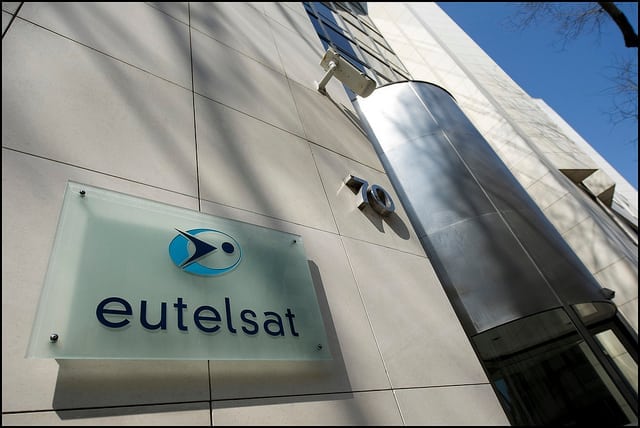Latest News

Eutelsat HQ
Eutelsat posted steady First Quarter (Q1) results on Thursday, with 315 million euros ($368 million) in revenue. Total revenues were down less than 1%, which Eutelsat said highlights the resiliency of its business.
Broadcast made up 62% of revenues, in line with the proportion it made up in 2019. Data & Professional Video made up 13% of revenues; with Government Services at 12%; Fixed Broadband 7%; and Mobile Connectivity 6%.
On a like-for-like basis, Government Services and Fixed Broadband saw revenue gains during the quarter, and the other verticals saw revenue decreases. Mobile connectivity experienced the greatest decrease, with revenues down 7% compared to 2019.
Q1 Broadcast revenues amounted to 191 million euros ($223 million), down 1.5% YOY. Eutelsat reported its satellites broadcast 6,683 channels, down 4% from 2019. But HD channels now make up a little over a quarter of those channels, representing growth over last year, providing stable Megabits per second consumption.
CFO Sandrine Téran said in a Thursday call with investors that broadcast revenue has been stable over the last 13 quarters, which is unique in the satellite industry. She attributed this stability to Eutelsat’s geographic exposure, its absence from the North American market, the resiliency of DTH broadcasting, and channel growth in emerging markets.
The operator highlighted its Sky Italia renewal in September, a multi-year contract with its largest broadcast representing a backlog of about 450 million euros ($532 million). Also in Broadcast, it highlighted its recent contract extensions with Tricolor TV in Russia and Azam TV in Sub-Saharan Africa, and new wins with BluTV and Switzerland’s Kabelio, which announced on Oct. 15 that it will use capacity on Eutelsat’s HOTBIRD video neighborhood for a new Swiss Direct-to-Home (DTH) HD platform.
CEO Rodolphe Belmer commented in a news release: “This performance demonstrates the general resilience of our business to the current environment. Although the rate of new business in certain verticals, in particular in Broadcast, is slower than usual against the general operating backdrop, we have nevertheless produced a solid commercial outturn securing several new contracts and renewals on favourable terms.”
Eutelsat is at a major turning point and is preparing to return to growth in the Fixed Broadband vertical. Téran said the KONNECT satellite will enter into service in the next couple of weeks. Its entry into service will be gradual, 80% of capacity in service by year end, and all capacity in service by March 2021. The satellite will cover both Europe and Africa, about 55% for Europe, 45% for Africa.
Eutelsat has now closed on its acquisition of Bigblu Broadband, which was announced with its Full Year 2019-20 results in July. Bigblu Broadband is the largest distributor of satellite broadband packages in Europe. In an interview with Via Satellite after the acquisition, Belmer said the Bigblu acquisition was strategically important because it provides a distribution arm to distribute and commercialize a broadband-to-consumer product across Europe.
“Acquiring BigBlu came out as the best possible solution because they have a presence almost everywhere in Europe with quite capable networks of distribution in many different countries,” Belmer said. “And they’re also a very skilled and capable and competent workforce, with highly talented managers. In that kind of business, people make the difference and that’s one of the reasons why we finally decided on the point instead of developing those capabilities.”
In addition, Eutelsat provided an update that the launch of its QUANTUM satellite for government services has been delayed from the Fourth Quarter of calendar year 2020 to the First Quarter of calendar year 2021. Eutelsat attributed the delay to co-passenger Star One D2. It will be launched by Arianespace.
In a May 2020 interview with Via Satellite, Belmer said he suspected that the COVID-19 lockdown would ultimately delay the QUANTUM launch. “Our Quantum satellite is almost manufactured, almost finished. However, we think the lockdown might cause of a delay to the launch of the program. We are delayed in two respects. Firstly, it will be launched on an Ariane 5 and there has the delay to launches from the Guiana Space Centre in Kourou, French Guiana. Second, we have a co-passenger, and we understand the manufacture of their satellite is being delayed by the lockdown of the manufacturing plant in which it is being finalized. Our best assumption is that the Quantum program will likely be postponed by 2-3 months.”
Get the latest Via Satellite news!
Subscribe Now